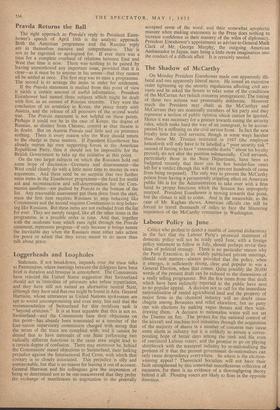Labour Policy in June .
Critics who profess to detect a rumble of internal disharmony in the fact that the Labour Party's promised statement of domestic policy will not be ready until June, with a foreign policy statement to follow in July, should perhaps revise their ideas of political strategy. There is no particular reason why the Party Executive, in its widely publicised private meetings, should rush matters—always provided that the policy, when it emerges, is sufficiently strong, clear and popular to win a General Election, when that comes. Quite possibly the 20,000 words of the present draft can be reduced to the dimensions of a really telling programme. But the few items from that draft which have been indirectly reported to the public have next to no popular appeal. A decision not to call for the immediate nationalisation of rented agricultural land and the property of major firms in the chemical industry will no doubt cause chagrin among Bevanites and relief elsewhere, but no party can win elections by making vague threats and then with- drawing them. A decision to nationalise water will not set the Thames on fire. The project for the national control of the aircraft and machine tool industries through the acquisition of the majority of shares in a number of concerns may cause some alarm in industry but it is unlikely to arouse a corres- ponding hope of better days among the rank and file even of convinced Labour voters; and the promise to go on playing shuttlecock with the transport industry by re-nationalising the portions of it that the present government de-nationalises can only cause despondency everywhere. So where is the election- winning appeal ? Theoretical Socialists will not have their faith strengthened by this somewhat miscellaneous collection of measures, for there is no evidence of a thoroughgoing theory behind it all. Floating voters are likely to float in the opposite direction.


































 Previous page
Previous page